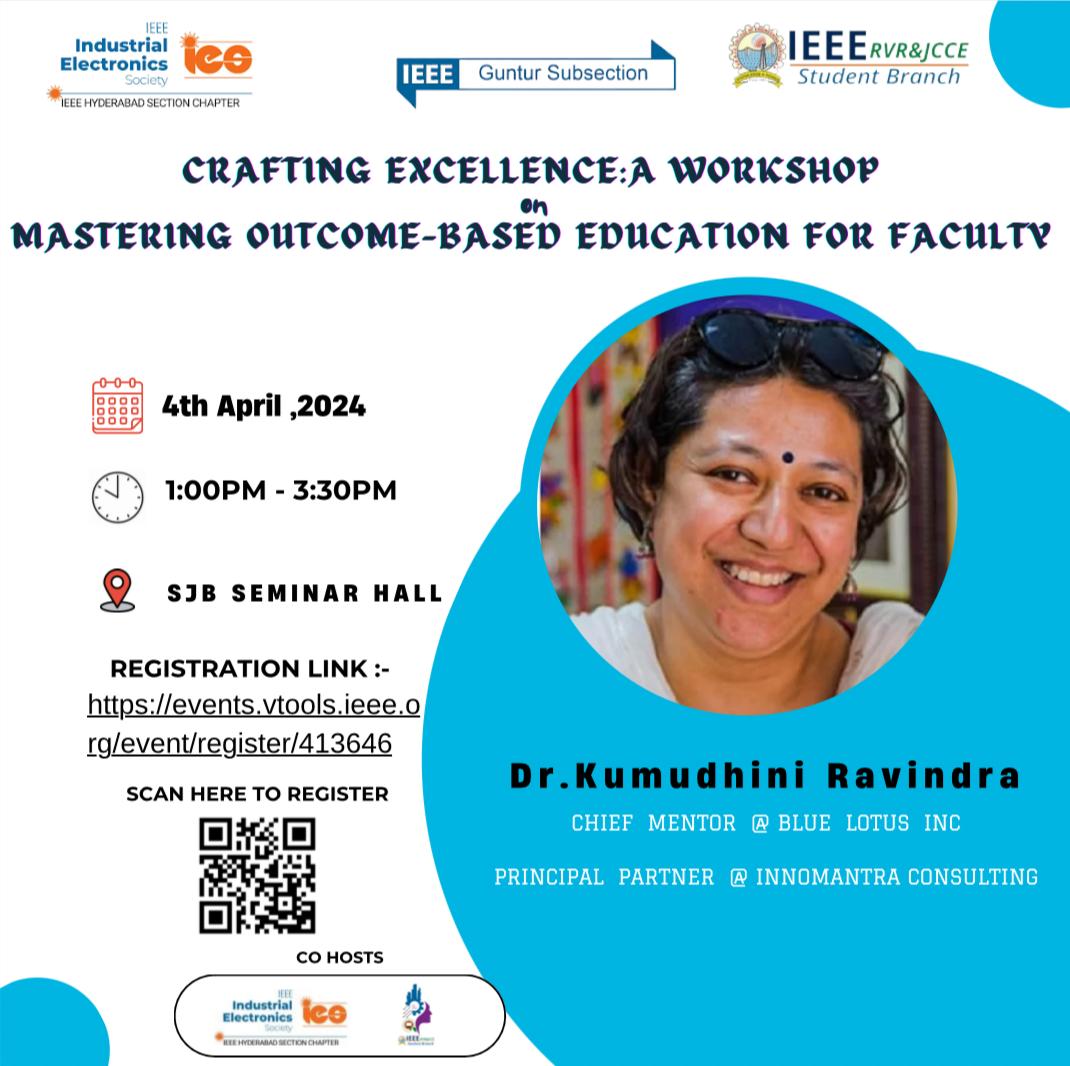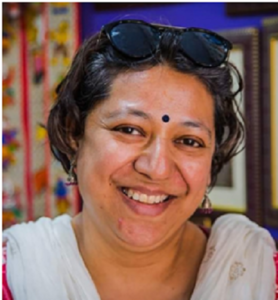"Crafting Excellence: A Workshop on Mastering Outcome-Based Education for Faculty"
Course design consists of choosing the competencies the students are expected to acquire at the
end of the course, assessment that is in alignment with the chosen competencies, and planning
instructional activities that facilitate students to acquire these competencies or graduate attributes.
The traits of graduates of engineering programs including transferable skills in India are expressed
as Graduate Attributes, as defined by NBA.
An outcome is what the learner will be able to do or perform as a result of some learning
experience. By the end of the educational experience, each student should have achieved the goal.
There is no single specified style of teaching or assessment in OBE; instead, classes, opportunities,
and assessments should all help students achieve the specified outcomes.
Outcome-Based Education, OBE is an approach to education in which decisions about
curriculum, instruction and assessment are driven by the exit learning outcomes that the student
should display at the end of a program or a course.
Objectives:
-
Introduce faculty members to the principles of Outcome-Based Education.
-
Provide insights into the significance of adopting innovative teaching approaches.
-
Encourage faculty to implement Outcome-Based Education in their teaching practices.
-
Explore the use of Instructional Systems Design (ISD) model to enhance teaching effectiveness.
Description: Teaching is a legacy of learning and passing on education across generations to make a good example of our learning. According to Dr. Kumidini, a good learner is well said to be a good teacher. This is justified by sharing an activity of the most influential teacher of your life. Passing on from generations, do we need to follow the same approach to create impacts on students? Creating intentional learning is easy. In the session, the professors were introduced to Outcome-based Education, a framework quite opposite from a time-based framework. An outcome-based framework is a design-thinking process where the faculty stays with the student in every approachable step but guides them to make their optimistic results. They can be made effective by providing information about their goal, having an objective-oriented session along complementing assessments to increase the efficiency of learning. This session is all about standardizing education with all possible innovative approaches: Faculty. The approach can be made productive using an ISD model.
The main session focused on Outcome-Based Education, contrasting it with traditional time-based frameworks. The concept was elucidated as a design-thinking process, wherein faculty members accompany students through their learning journey, guiding them towards achieving optimistic results. The workshop stressed the importance of setting clear learning objectives, conducting objective-oriented sessions, and implementing complementary assessments to enhance learning efficiency.
Implementation Strategies:
The workshop underscored the need for intentional learning and standardized education through innovative approaches. Faculty members were encouraged to adopt the ISD model to craft productive teaching experiences. Discussions revolved around practical strategies for integrating Outcome-Based Education principles into existing curriculum structures.
Question and Answer Session:
All sessions concluded with an interactive question and answer segment, allowing participants to seek clarification and engage in meaningful discussions. Participants actively shared their insights and experiences, enriching the learning environment.
Conclusion:
The “Crafting Excellence” workshop provided faculty members with valuable insights into Outcome-Based Education and its potential to revolutionize teaching practices. By emphasizing the importance of innovation and intentional learning, the workshop aimed to equip faculty with the tools necessary to create impactful educational experiences. The interactive nature of the sessions fostered collaboration and idea-sharing among participants, further reinforcing the workshop's objectives.
Future Directions:
Moving forward, it is imperative to continue promoting Outcome-Based Education and supporting faculty members in implementing innovative teaching methodologies. Follow-up sessions, resources, and mentoring opportunities can further enhance faculty readiness and efficacy in crafting excellence in education.
This report encapsulates the key highlights and outcomes of the “Crafting Excellence” workshop, underscoring the importance of embracing transformative approaches to education.
Outcomes:
Key Highlights:
Understanding Learners:
Participants learned the importance of understanding students' needs and preferences to design effective course structures. They were encouraged to conduct research and gather insights into students' learning styles and motivations.
Trying Out Ideas:
The workshop emphasized the value of experimentation and iteration in course design. Participants were encouraged to prototype different teaching methods and activities and test them with small groups of students to gather feedback.
Working Together:
Collaboration was highlighted as a key aspect of the design thinking process. Participants engaged in group activities and brainstorming sessions to generate creative ideas for course structure and content.
Listening and Improving:
The importance of listening to feedback and continuously improving course structures was emphasized. Participants were encouraged to seek feedback from students and colleagues and make adjustments to their courses based on this feedback.
Conclusion:
The workshop provided valuable insights and practical strategies for designing course structures using design thinking principles. Participants left with a deeper understanding of the importance of empathy, experimentation, collaboration, and continuous improvement in creating engaging and effective learning experiences for students.
Date and Time
Location
Hosts
Registration
-
 Add Event to Calendar
Add Event to Calendar
Loading virtual attendance info...
- SJB Seminar Hall
- RVR & JC College of Engineering
- Guntur, Andhra Pradesh
- India 522019
- Building: Silver Jubilee Block
- Starts 20 March 2024 06:30 PM UTC
- Ends 04 April 2024 08:05 AM UTC
- 0 in-person spaces left!
- No Admission Charge
Speakers
Kumudhini of Chief Mentor @ Blue Lotus Inc
Designing Courses for Outcome Based Education
Biography:
Dr. Kumudhini Ravindra is a Business Transformation Leader with
two and a half decades of multidisciplinary experience. She is the
Principal Partner – Strategic Innovation, Sustainability & Standards at
Innomantra Consulting, and Chief Mentor & Founder of Blue Lotus
Inc. Her expertise is in the areas of clean technologies, innovation,
design, and systems thinking. She is also the expert delegate from India
on the ISO Technical Committee for drafting the Innovation
Management Systems Standards (ISO 56000 series).
A recognized thought leader, Dr. Kumudhini has worked and contributed to various clean tech
projects across the globe. Her work on designing and implementing community microgrids was
pioneering research on Microgrids in India. She has a strong quantitative & system modelling
background along with Innovation Product Lifecycle Management (iPLM) experience.
Prior to Innomantra, Dr. Kumudhini was the CTO at Noorgo Inc a U.S Innovation and Idea
Management organization. She has been a co-founder of several Cleantech and education-
based organizations; and brings with her a focused approach to problem solving. She has
created scaling up and growth strategies for companies in cleantech and hi-tech industries. She
held senior roles as a Business Strategy Consultant, Senior Business Analyst and Systems
Engineer for hi-tech firms like Tata Infotech, Daimler Chrysler India, Power Research &
Development Consultants along with mentoring startups like Nisiki Technologies, Sky Group,
Pranava Biofuels, and Chalkboard Academy. She has been a serial entrepreneur.
Dr. Kumudhini has a Ph.D. in Energy Modelling and Management from the Indian Institute of
Science (IISc), Bangalore, India. She holds an MBA from the Department of Management
Studies, IISc; a BE (Electrical & Electronics) from UVCE, Bangalore University, and was a
short-term Research Scholar at the Lawrence Berkeley National Laboratory in 2010. She has a
PG Diploma in Innovation & Design Thinking from Emeritus Institute Singapore. Kumudhini
was a university rank holder and has won many accolades from industry and academia over
the years.
Dr. Kumudhini has been an active member of IEEE for over 15 years and has held executive
positions in Power & Energy Society and Women in Engineering. She was the Chair of IEEE
Bangalore WIE AG in 2022 and was Chair Elect of the Education Society IEEE Bangalore
Section (2020-23). She is the Chair of the Energy working group of the IET India Future
Technology Panel. She mentors government agencies, educational institutions, and startups
with a focus on strategy, innovation, and process re-engineering. She has also authored books,
numerous articles in international peer-reviewed journals and is a visiting faculty in
management and engineering institutions across India.
Email:
Address:Bangalore, India
Agenda
This workshop addresses the following topics:
1. Outcome Based Education (OBE), its advantages & concerns
2. Characteristics of good teaching
3. OBE in the curriculum and courses - a hands-on activity
4. Incorporating activity-based learning techniques into course and instruction design.
5. Assessment & evaluation using rubrics.
Media
| WhatsApp_Image_2024-04-04_at_10.48.38_PM | Event Photo | 1.45 MiB |
| Event Report | 2.79 MiB |



